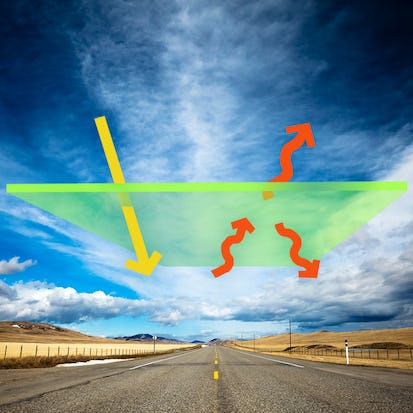- Level Foundation
- Duration 39 hours
- Course by The University of Chicago
-
Offered by

About
This class describes the science of global warming and the forecast for humans' impact on Earth's climate. Intended for an audience without much scientific background but a healthy sense of curiosity, the class brings together insights and perspectives from physics, chemistry, biology, earth and atmospheric sciences, and even some economics"all based on a foundation of simple mathematics (algebra).Modules
Welcome!
1
Videos
- Video Introduction
4
Readings
- Resources
- Debriefing Quizzes
- Explainer Assignments
- A Supplemental Class to This One
Heat and Energy
2
Assignment
- Optional Problems: How Much Coal to Run a Light Bulb
- Optional Problems: Comparing Energy Prices
3
Videos
- Using Units
- Units of Energy
- Heat
Light
3
Videos
- Units of Light
- Light
- Blackbody Radiation
Explainer
1
Peer Review
- What is heat and how can you warm up something in space?
Models of Planetary Climate
3
Assignment
- Optional Layer Model Problem: How Hot is the Moon?
- Optional Layer Model Problem 2: A Stronger Greenhouse Effect
- Optional Layer Model Problem 3: Nuclear Winter
2
Videos
- Naked Planet Climate Model
- The Greenhouse Effect
Debriefing Quizzes
1
Assignment
- Quiz 1
How The Greenhouse Effect Works
1
Assignment
- Model Greenhouse Gases in the Atmosphere
2
Videos
- Greenhouse Gas Physics
- The Band Saturation Effect
What Holds the Atmosphere Up
1
Assignment
- Model the Lapse Rate and Greenhouse Effect
2
Videos
- Atmospheric Temperature Structure
- Pressure in a Standing Fluid
Why It's Colder Aloft
2
Videos
- Water Vapor and Latent Heat
- Moist Convection
Big Whorls form Smaller Whorls
4
Videos
- Heat Transport
- Coriolis Acceleration
- Geostrophic Motion
- The Turbulent Cascade
Debriefing Quizzes
1
Assignment
- Quiz 2
How They Work
5
Assignment
- Model Sunlight, Albedo, and Climate
- Extract the Water Vapor Feedback from Climate Model Results
- Model Clouds 1: IR
- Model Clouds 2: Full-spectrum
- Model Aerosols and Climate
5
Videos
- Positive and Negative Feedback
- Ice Albedo Feedback
- Water Vapor Feedback
- Clouds
- Aerosols
What They Mean
1
Assignment
- Calculate the Climate Sensitivity
1
Videos
- Climate Sensitivity
Debriefing Quizzes
1
Assignment
- Quiz 3
Explainer
1
Peer Review
- What are positive and negative feedbacks?
The Carbon Cycle and Climate
1
Assignment
- Model the Global Carbon Cycle
3
Videos
- The Weathering CO₂ Thermostat
- The Goldilocks Planets
- The Oceans in the Carbon Cycle
The Biosphere in the Carbon Cycle
2
Assignment
- Model Ocean/Land CO₂ Uptake with ISAM
- Model Intended vs. Greenhouse Yields
3
Videos
- The Land Biosphere in the Carbon Cycle
- The Battery of the Biosphere
- Oxidation and Reduction of Carbon
Fossil Fuels
3
Videos
- Coal
- Oil
- Natural Gas
Debriefing Quizzes
1
Assignment
- Quiz 4
Fossil Fuels
2
Assignment
- Model Hubbert's Peak
- Model Kaya Identity
1
Videos
- Forecasting Future Emissions
Explainer
1
Peer Review
- Fossilizing a Carbon Atom
Human Impact on the Carbon Cycle
2
Assignment
- Model Methane and Slugulator
- Model the Long Tail
6
Videos
- Where Our Carbon Is Going
- Ocean Buffer Chemistry
- The Perturbed Carbon Cycle
- Methane as a Greenhouse Gas
- The Long CO₂ Tail
- Why the CO₂ Tail Matters
Debriefing Quizzes
1
Assignment
- Quiz 5
Explainer
1
Peer Review
- Burning a Carbon Atom
The Smoking Gun
2
Assignment
- Make Maps of Climate Models Warming
- Look for the Smoking Gun
4
Videos
- Land Surface Temperature Records
- Sea Surface Temperature Records
- Satellite Temperature Records
- The Smoking Gun: Warming Since the 1970s
Lessons from the Deep Past
3
Assignment
- Browse the Global Glacier Length Data
- Model Borehole Temperatures
- Analyze Recent Solar Intensity Changes
6
Videos
- Paleoclimate and Proxy Measurements
- Tree Rings
- Borehole Temperatures
- Oxygen Isotopes
- Solar Intensity and the Hockey Stick
- Glacial - Interglacial Cycles
Debriefing Quizzes
1
Assignment
- Quiz 6
Explainer
1
Peer Review
- Is it Warming? Is It Us? How Do We Know?
Fresh Water
2
Assignment
- Water Stress in Climate Model Results
- Model Permafrost
3
Videos
- Global Weirding
- Monsoons
- Vegetation
Ice Sheets and Sea Level
3
Assignment
- Model Changes in Sea Level
- Play with an Ice Sheet Model, ISM
- Short vs Long Term Sea Level Change
4
Videos
- Impacts of Sea Level
- Antarctic Ice Sheet
- Greenland Ice Sheet
- Paleo Sea Level Changes
Weather
3
Assignment
- Find the Increase in Low-Level Humidity in Models
- Extract AR5 Model Lapse Rates
- Model Hurricanes
3
Videos
- Water Vapor and Storminess
- Hurricanes
- Extreme Weather
Follow-On Effects
2
Videos
- Ecosystem Impacts
- Human Impacts
Debriefing Quizzes
1
Assignment
- Quiz 7
Explainer
1
Peer Review
- Global Weirding
How Much CO2 is Too Much?
3
Assignment
- Model Stabilization Scenarios
- Model Temperature Targets
- How well does Slugulator do at Slug Theory?
3
Videos
- Stabilization Scenarios
- Temperature Targets
- Slug Theory
Options
4
Assignment
- Model CO2 Sequestration
- Model SRM Geoengineering
- How Many Wedges?
- How Much Carbon-Free Energy by 2100?
5
Videos
- Geoengineering: CO₂ Capture and Sequestration
- Geoengineering: Solar Radiation Management
- Economics of Climate Change
- Mitigation: Short-Term
- Mitigation: Long-Term
Debriefing Quizzes
1
Assignment
- Quiz 8
Explainer
1
Peer Review
- Is there Hope for the 11-year-old?
Term Project
1
Peer Review
- Term Project: Explore Climate Data and Models
Research Survey: "Student Attitudes Toward Massive Open Online Courses (MOOCs)"
1
Readings
- Survey on Attitudes toward MOOC technology
Auto Summary
Discover the science behind global warming and its impact on Earth's climate with "Global Warming I: The Science and Modeling of Climate Change." This foundational course, taught by Coursera, integrates insights from physics, chemistry, biology, and more, making it perfect for curious learners without extensive scientific backgrounds. Over 2340 minutes, you'll explore climate change through simple algebra. Available subscriptions include Starter, Professional, and Paid options. Ideal for anyone eager to understand the science behind one of today's most pressing issues.

David Archer

